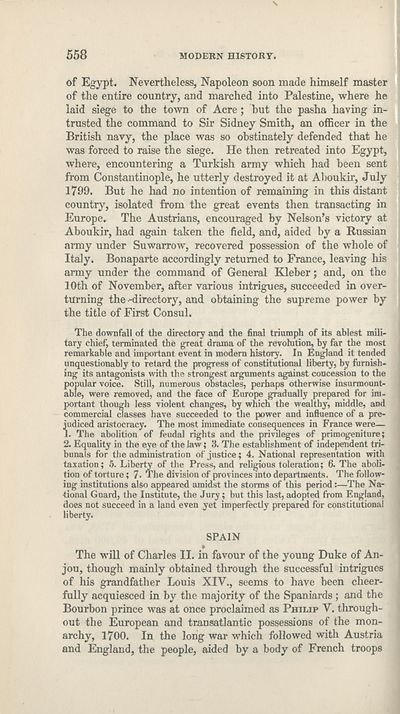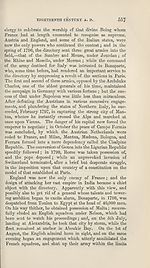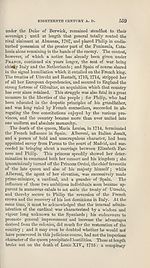Download files
Complete book:
Individual page:
Thumbnail gallery: Grid view | List view

558
MODERN HISTORY.
of Egypt. Nevertheless, Napoleon soon made himself master
of the entire country, and marched into Palestine, where he
laid siege to the town of Acre; but the pasha having in¬
trusted the command to Sir Sidney Smith, an officer in the
British navy, the place was so obstinately defended that he
was forced to raise the siege. He then retreated into Egypt,
where, encountering a Turkish army which had been sent
from Constantinople, he utterly destroyed it at Aboukir, July
1799. But he had no intention of remaining in this distant
country, isolated from the great events then transacting in
Europe. The Austrians, encouraged by Nelson’s victory at
Aboukir, had again taken the field, and, aided by a Russian
army under Suwarrow, recovered possession of the whole of
Italy. Bonaparte accordingly returned to France, leaving his
army under the command of General Kleber; and, on the
10th of November, after various intrigues, succeeded in over¬
turning the -directory, and obtaining the supreme power by j
the title of First Consul.
The downfall of the directory and the final triumph of its ablest mili¬
tary chief, terminated the great drama of the revolution, by far the most
remarkable and important event in modern history. In England it tended
unquestionably to retard the progress of constitutional liberty, by furnish¬
ing its antagonists with the strongest arguments against concession to the
popular voice. Still, numerous obstacles, perhaps otherwise insurmount¬
able, were removed, and the face of Europe gradually prepared for im¬
portant though less violent changes, by which the wealthy, middle, and
commercial classes have succeeded to the power and influence of a pre¬
judiced aristocracy. The most immediate consequences in France were—
1. The abolition of feudal rights and the privileges of primogeniture; ]
2. Equality in the eye of the law; 3. The establishment of independent tri¬
bunals for the administration of justice; 4. National representation with
taxation; 5. Liberty of the Press, and religious toleration; 6. The aboli- J
tion of torture; 7. The division of provinces into departments. The follow¬
ing institutions also appeared amidst the storms of this period :—The Na¬
tional Guard, the Institute, the Jury; but this last, adopted from England,
does not succeed in a land even yet imperfectly prepared for constitutional I
liberty.
SPAIN
The will of Charles II. in favour of the young Duke of An¬
jou, though mainly obtained through the successful intrigues
of his grandfather Louis XIV., seems to have been cheer¬
fully acquiesced in by the majority of the Spaniards; and the
Bourbon prince was at once proclaimed as Philip V. through¬
out the European and transatlantic possessions of the mon¬
archy, 1700. In the long war which followed with Austria
and England, the people, aided by a body of French troops
MODERN HISTORY.
of Egypt. Nevertheless, Napoleon soon made himself master
of the entire country, and marched into Palestine, where he
laid siege to the town of Acre; but the pasha having in¬
trusted the command to Sir Sidney Smith, an officer in the
British navy, the place was so obstinately defended that he
was forced to raise the siege. He then retreated into Egypt,
where, encountering a Turkish army which had been sent
from Constantinople, he utterly destroyed it at Aboukir, July
1799. But he had no intention of remaining in this distant
country, isolated from the great events then transacting in
Europe. The Austrians, encouraged by Nelson’s victory at
Aboukir, had again taken the field, and, aided by a Russian
army under Suwarrow, recovered possession of the whole of
Italy. Bonaparte accordingly returned to France, leaving his
army under the command of General Kleber; and, on the
10th of November, after various intrigues, succeeded in over¬
turning the -directory, and obtaining the supreme power by j
the title of First Consul.
The downfall of the directory and the final triumph of its ablest mili¬
tary chief, terminated the great drama of the revolution, by far the most
remarkable and important event in modern history. In England it tended
unquestionably to retard the progress of constitutional liberty, by furnish¬
ing its antagonists with the strongest arguments against concession to the
popular voice. Still, numerous obstacles, perhaps otherwise insurmount¬
able, were removed, and the face of Europe gradually prepared for im¬
portant though less violent changes, by which the wealthy, middle, and
commercial classes have succeeded to the power and influence of a pre¬
judiced aristocracy. The most immediate consequences in France were—
1. The abolition of feudal rights and the privileges of primogeniture; ]
2. Equality in the eye of the law; 3. The establishment of independent tri¬
bunals for the administration of justice; 4. National representation with
taxation; 5. Liberty of the Press, and religious toleration; 6. The aboli- J
tion of torture; 7. The division of provinces into departments. The follow¬
ing institutions also appeared amidst the storms of this period :—The Na¬
tional Guard, the Institute, the Jury; but this last, adopted from England,
does not succeed in a land even yet imperfectly prepared for constitutional I
liberty.
SPAIN
The will of Charles II. in favour of the young Duke of An¬
jou, though mainly obtained through the successful intrigues
of his grandfather Louis XIV., seems to have been cheer¬
fully acquiesced in by the majority of the Spaniards; and the
Bourbon prince was at once proclaimed as Philip V. through¬
out the European and transatlantic possessions of the mon¬
archy, 1700. In the long war which followed with Austria
and England, the people, aided by a body of French troops
Set display mode to:
![]() Universal Viewer |
Universal Viewer | ![]() Mirador |
Large image | Transcription
Mirador |
Large image | Transcription
| Antiquarian books of Scotland > Education > Elements of universal history on a new and systematic plan > (578) |
|---|
| Permanent URL | https://digital.nls.uk/127587076 |
|---|
| Description | Thousands of printed books from the Antiquarian Books of Scotland collection which dates from 1641 to the 1980s. The collection consists of 14,800 books which were published in Scotland or have a Scottish connection, e.g. through the author, printer or owner. Subjects covered include sport, education, diseases, adventure, occupations, Jacobites, politics and religion. Among the 29 languages represented are English, Gaelic, Italian, French, Russian and Swedish. |
|---|

